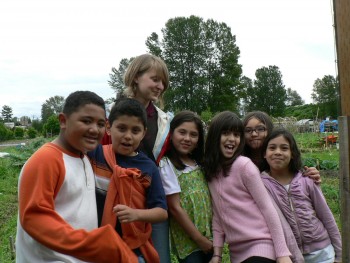Promoting Access to Healthy Food

Isobel Grad '11 with children in Seattle's Lettuce Link program.
Details
Every time a new group visits the Lettuce Link urban farm, Isobel Grad brings them to the pea vines in the garden. Most of the children and their parents, who live in a primarily immigrant, low-income community in South Seattle, have never seen anything but canned peas.
When Grad tells them they can just pick a pea and eat it off the vine, pod and all, they give a look of disgust. "Noooo, I don't like that," they say, but the minute Grad takes one and starts munching on it, they become curious and she hands them a pea to try. "We usually end up picking 10 more and putting them in their pockets," says Grad. "It's a fun thing to see, because it is a really good example of success, even if it's a very small one."
From the success of a single pea, to large-scale community projects, Grad has been working with Solid Ground's Lettuce Link Program to create access to organic produce, seeds, and gardening information for low-income families and to educate the community about food security and sustainable food production. Grad, a sociology major and environmental studies minor, was granted funding from the Center for Peace and Global Citizenship to put academics into practice with Solid Ground, a large umbrella nonprofit that runs nearly 30 community development, anti-racism and poverty alleviation programs throughout Seattle. These programs help over 38,000 households each year.
The non-profit's Lettuce Link project donates all the food grown on its urban farm to a South Seattle food bank, which is especially beneficial since there are no real grocery stores in the area. Children from the local elementary school and community center summer program come to the farm once a week and plant their own gardens, learn about farming and the environment, and learn to cook food that is good for them. Grad has been working both in the office and on the farm, helping plant and harvest, and run the children's program. She is also performing administrative tasks in the office and creating presentations for grant requests.
"One of the most interesting—and exciting—things I've experienced so far is how much the children love to learn about the garden, and how excited they are about eating vegetables once they get involved in learning about food and growing it themselves," she says. "It's really great to see how easy it is to change their perspective on their connection to the environment and their own health."
In addition to learning about gardening and managing large groups of children, Grad has discovered how to better share her own knowledge with other people. She is not sure if she wants a career in social work, but she does hope to do something involving food and sustainable agriculture. Even though Seattle is her hometown, this internship has exposed Grad to a community she had never seen before. "I had no idea how many different, and relatively large, cultural enclaves existed in Seattle," she says. "It's been great to learn so much about the place I grew up and interact with new groups of people."
--Heather Harden '11



